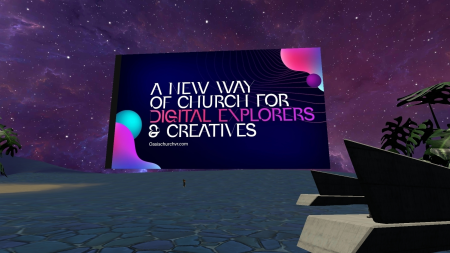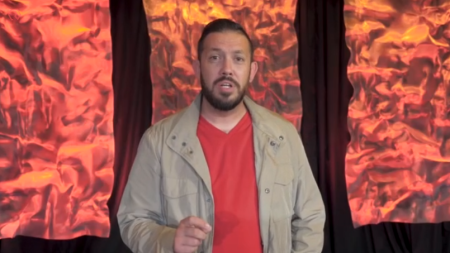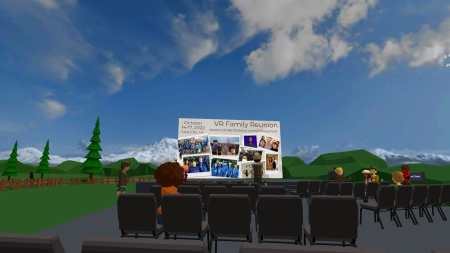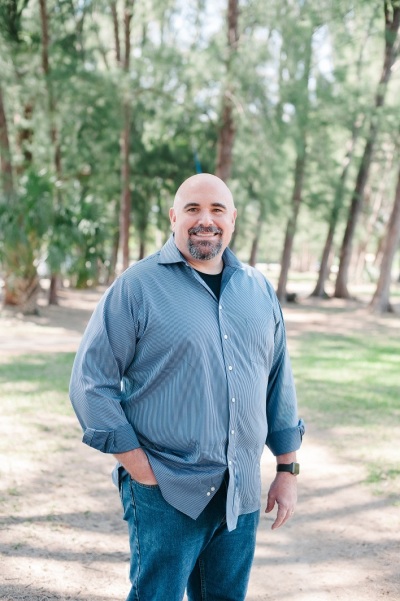How the digital revolution is disrupting the Church and forcing it out of buildings

About a year ago, Andre Anderson started a group on Facebook called Barbecue Assembly of God to build “a church of people who love Barbecue and want to move forward in their faith journey.” The group has since swelled to more than 500 members, and two Sundays ago, Barbecue Church held its “first official service” online.
“You know, our thing is [we] want to help feed people biblically, spiritually and literally,” said Anderson, who announced himself as the lead pastor of Barbecue Church at the start of the service. “We’re going to do that in a bunch of different ways.”
Anderson went on to describe how different his church would be. Along with barbecue, the church would serve up sermons that are “quick, easy, [and] straight to the point.”
“We’ll put up cooking videos, training videos on how to cook different things. We’re just going to have a good time. It’s going to be different. It’s going to be fun. It’s going to be wild,” he said.
The sermon ended approximately 10 minutes after it started.
While he plans to embrace everyone who comes to check out Barbecue Church, Anderson expressed little concern over those who might not like his brand of fellowship.
“If you like it, cool. If you don’t, scroll on,” he said. “We just want the best for you and want you to find your spot. So no matter where you’re at in your faith journey, you can eat with us. We’re here.”
A digital explosion of church

Like Anderson, millions of people have been unapologetically finding their spot by exploring different ways to express their faith through digital platforms like social media and virtual reality.
On TikTok alone, Christian-related video content has amassed more than 31 billion views and made stars out of young influencers like 23-year-old Maurice Dowell of Lawton, Oklahoma. His inspiring videos have been liked nearly 76 million times.
And since he started using the app to minister in 2018, Dowell has gained some 3.8 million followers, dwarfing the following of more traditional megachurch preachers on the app like Joel Osteen and T.D. Jakes.
In a 2020 interview with ABC 7 News, he credited God for the popularity of his message.
“It’s my purpose to inspire people, care for people and just love people back to life, so people say I’m TikTok famous, I give all glory to God,” Dowell said. “Someone just said you just turned an atheist to a believer. My life is so much better now. If you don’t think that’s a place to praise the Lord right there!”
@mauricedowell Verse of the Day•Galatians 6:9 ??????????#fyp#Love#christian#foryou? the night we met - favsoundds
Elijah Lamb, another popular Christian TikTok teenager with nearly 670,000 followers, acknowledged in a video in late 2020 that while the work of Christian TikTok isn’t perfect, there is no denying the impact they're having in connecting their generation with the Gospel.
“I think the way that so many young Christians on this app are zealously pursuing truth and preaching the Gospel without shame is amazing,” Lamb said. “I think there is such an amazingly diverse group of creators who make equally diverse content.
“Christian TikTok has pushed me to step up and learn how to lead better. I think the vulnerability that so many people on this app have blows my mind and it makes me so joyful. The people I’ve met through this app have made me feel more loved than almost anyone else,” he added.
@elijah.lamb#THEGOODTHINGS tag me & share what you love about this community!! #noNUANCEnovember#christiantiktok? original sound - elijah lamb
Oasis Church VR is a church that solely exists in the metaverse, which Facebook describes as “a set of virtual spaces where you can create and explore with other people who aren’t in the same physical space as you.”
“We curate creative church experiences in virtual reality for people who feel excited about digital spaces’ & fresh opportunities. Oasis is for people who are bored with the way their forefathers did church,” the church states on its website. “These can be creatives that are Metaverse explorers and people who would not be comfortable going into a building. Oasis will reach persecuted people in other countries. We will have a strong missional outreach component giving Oculus devices to those in need and supporting persecuted believers worldwide.”
At a recent Sunday service, Oasis Church VR leaders unveiled their new futuristic build that came complete with an immersive study of the book of Ruth in the Bible. Scenes from the four-chapter book were visually brought to life in 3D as the audience read through the story, teleporting from scene to scene with engaging discussion.
As online Christian engagement continues to expand rapidly through the use of digital technologies, it has coincided with a staggering disruption in physical church membership, which some technology experts say will continue to displace physical churches that refuse to adapt to the digital revolution. And the ongoing displacement is becoming more apparent in the wake of the COVID-19 pandemic.
The historic decline in physical church membership

A Gallup analysis in March 2021 showed that while America remains a highly religious nation with seven in 10 claiming affiliation with some kind of organized religion, for the first time in nearly 80 years, fewer than half of them claim any formal membership in a specific house of worship.
One of the biggest factors Gallup found strongly correlates with church membership is age. Some 66% of traditionalists — U.S. adults born before 1946 — have formal membership in a church, compared with 58% of baby boomers, 50% of those in Generation X and 36% of millennials. Current but limited data on members of Gen Zers who've already reached adulthood suggest their church membership rate is similar to millennials.
The analysis also pointed to the growing number of Americans who express no religious preference. In the last 20 years, the share of Americans who do not identify with any religion has grown from 8% in 1998 to 2000 to 21% in the last three years. Only 4% of people from this group said they held formal membership in a church, synagogue or mosque. Between 1998 and 2000 that figure was 10%.
In 2020, just over a week after leaders of a Minnesota church were accused of trying to get rid of older adult members from one of their campuses in an effort to attract a younger crowd, a new study from Barna showed how reaching the next generation is one of the biggest problems pastors in local churches worry about today.
When presented with a list of possible challenges facing their church as part of Barna’s State of the Church 2020 project, just over half of Protestant pastors, 51%, said “reaching a younger audience” is a major issue for their ministry.

Chestly Lunday, an expert in innovative leadership who has helped churches and companies lead in the digital age, told CP in a recent interview that one of the biggest reasons behind the declining statistics in traditional church membership is that the younger generation and innovative Christians have migrated online while older adults refuse to adapt.
“What we're seeing [now] is the exodus of the late majority [from traditional churches],” Lunday said. “We're not seeing the exodus of early adopters [of technology], and the early majority of innovators. They've been gone already for a while. So what you're seeing now, like one major church, where pre-pandemic people were coming 1.4 times a month, now they're coming point 0.8 times per month, meaning one of the best communicators in North America can't get somebody [in church] to tell [them about Jesus] once a month a year anymore. That's what that means.
“Church of the future is a network. And it's going to be digitally based. It's not going to be geographically based. It's going to be built on relationships and purpose,” he said.
The growing use of digital technology to fellowship among Christians has led to increased connection between diverse groups of Christians across geographic and denominational boundaries, Lunday said.
Adaption

He believes that the biggest threat to the survival of the Church today is the resistance among its older constituents, most of whom remain in the pews of dying congregations, to the advances of digital technology.
“I think the biggest threat for churches is their constituency who are older that don't want to do anything digitally,” he said.
In January, Lunday teamed up with fellow innovator and longtime digital church advocate Jeff Reed to form the Digital Church Network which seeks to empower “people to utilize Digital & Metaverse tools to connect, engage and disciple.”
He explained that church leaders have been stuck on applying a 1,700-year-old model of church designed for a world that no longer exists.

“Digital platforms are disrupting churches. This didn't happen during the pandemic. That happened when Web 2.0 came out. So if you look at the history of the church, you see that our model, our prevailing model right now, was invented 1,700 years ago,” he explained.
“When Constantine legalized Christianity, we came out of the shadows and we built, we city-planned and built buildings so that people that were illiterate and farming could come and hear Scripture, apply it to their daily lives and come and be in community with people, even though they wouldn't be with them six days out of the week, they would actually go back to their farms and work,” he said.
Through that model, the physical church building became a centralized platform for worship, but technology has upended it.
“What digital technology did, especially during Web 2.0, when we created social media platforms, the building blocks of that wasn't the media side it was actually the connection side,” Lunday said. “We've completely decentralized relationships.”
The main need for physical church buildings, Lunday said, was to provide content and community. The ability to access both content and community online has made traditional church buildings irrelevant.
“We have to create an organization that is built for a Web 2.0 world,” he said.
“If I can help churches move from 1.0 to 2.0 and start thinking about what it'll look like to actually create community on an asynchronous digital space that is not predicated on everybody watching the same content at the same time, but it being on demand — and it's still having events and get-togethers, whether it be virtually, whether it be physically — those are the things that I would like to see the church do,” Lunday explained. “I think they (traditional church leaders) are threatened by it because that's not what they know. That's not what they feel comfortable with. That's not what they like.”
Even if many traditional churches decide to retool their ministries today, said Lunday, there is no guarantee that they will survive.
He cited arguments from Clayton M. Christensen’s 2011 book, The Innovator’s Dilemma: The Revolutionary Book That Will Change the Way You Do Business as well as the Bible to show why it will be difficult for many churches to adapt.
“You're going to start seeing a massive exodus from churches that think the old way because that's not how people relate to each other anymore. Content is a commodity, it's not king, it's a currency. And that's the point that needs to be shifted. My goal is to help churches see that and redesign their ministries for a world that exists. Right now. They're designed for a world that no longer exists,” he said.
He believes that what will likely happen is that younger leaders are simply going to move forward with digital ministries and leave behind older church members who refuse to or cannot adapt.
“I think what you're going to see with younger leaders … they're not going to try to keep the old people. They're just going to go and do new things. And they're going to have people that want to come with them. And unfortunately, I mean, Jesus said this a long time ago, right? He said, ‘Don't try to put new wine into old wineskins,’” he said. “This is a new wineskin moment with new wine. And the reality is if you try to put it into the old wineskins, you're going to lose the beauty of both.”
He added: “Jesus understood disruption and He was a disrupter Himself. And His advice to all of us disruptors are to go with the goers, don't try to save the past, that can't be done. And by trying to mix your new thing with the old thing, you'll actually lose both in the process. And so I think that there will be 4 percent of our churches that will make the jump, just like Clayton Christensen said with organizations.”
The impact of the digital disruption on pastors and parishioners
New data released by Barna Group last month show that fears over the membership of their church being in decline was among the biggest factors causing stress and loneliness among pastors, forcing an increasing number of them to consider quitting compared to a year ago.
Some 29% of pastors said they felt like quitting because they weren’t optimistic about the future of their church and they were unhappy with the impact the job had on their family or they had a vision for the church that was in conflict with where the church wanted to go.
Lunday says he understands the frustration because pastors are working harder for a shrinking audience in physical churches.
“It's absolutely fueling the burnout and the disappointment because you're doing the things you've always done and it's not getting the results that you used to have. And you don't know why it's not working but you know, it's not working,” Lunday said. “I think what you're seeing [are] two major things: older pastors that don't want to change and move into a digital decentralized paradigm of church, and you're seeing them opt for retirement now while there's still money in the bank.”
These struggling ministries that don’t want to change, said Lunday, are also likely to have a harder time attracting younger leadership because younger pastors know that “it's easier to have a baby than it is to raise the dead.”
“People [pastors remaining in physical churches] have a deep sense of loyalty. They want to make this work. And so they're staying and they're working harder because the visionaries have left the building. And they're just trying to do the things they've always done, except they're now expending more energy and spinning their wheels, and they feel it, but they don't know what to do. And they don't feel like it's morally OK for them to leave. And I think that's OK,” Lunday said.
“Some of them are called to stay with the sheep because they're shepherds. Every ministry leader should have the heart of a shepherd. But not every ministry leader is gifted as one. And so some of the people that are there that are gifted as one, they're feeling it, they're going to stay no matter what because that's what shepherds are supposed to do. But I think there's a lot of people that want to leave, that probably should leave that don't feel like they have permission to leave,” he added. “And that's not God putting that lack of permission on them, it's them putting that lack of permission on them because they're afraid of what's on the other side. “
A more diverse church experience
While both Lunday and Reed agree that the digital shift was well underway before the pandemic began and it is likely too late for many traditional churches to transition, Reed argues that digital churches should not be viewed as competing with physical ones.
“The first online Bible study that I ever taught was in the year 2000, 22 years of doing digital ministry, and all the way up to COVID people thought I was nuts,” Reed said. “Well, thank you very much. COVID validates a lot of what we were talking about. And we saw proof that it would work. And so now, you know, I don't need to be the digital church apologist, but I need to create a community where others can feed off each other and work together for the common good.”
Reed explained that the trends he has seen emerging amid the digital disruption of the Church show that digital churches are reaching a different type of person than what the traditional church building is reaching. Church is no longer a one size fits all and messages need to be tailored to a specific audience.
To drive home this point, he cited marketing expert Seth Godin’s advice that a billion people “don’t care what you have to say.”
“In 1995, Billy Graham spoke one sermon and a billion people heard it around the world,” Reed said. “[In] 2022 it's not going to happen.”
He argued that in order for the Church to continue to get its message across the world it can no longer be about mass communication.
“[It’s] about the individual, but the big churches, the Life churches … they'll serve their purpose, and they'll still reach people. But we're already seeing it where these digital churches that have a more nuanced voice are also effective in reaching different types of people than the buildings are reaching,” Reed said. “We're seeing atheists and agnostics come to Jesus. We're seeing the Church. The first step back to the bride of Christ is through virtual reality headsets. We're seeing satanists come to Jesus through relationships in virtual reality.
Digital Church Research Report published in October 2021 features data collected from interviews with 29 pastors from Aug. 21 through Sept. 17, 2021, on the function and operation of churches in the U.S. operating either as online-only churches or as churches with an online campus or associated ministry.
“There was consensus that the church did not need a specific structure or form to be a church. Rather, it had to meet a set of biblical criteria that included meeting together, making disciples, growing in knowledge and understanding of God and His redemptive work through Jesus, and taking that message to the wider community,” the report said.
Among other data, the report also highlighted how participants in online churches were less likely to give financially to the church and when they do give the amount was generally lower than the amount given on average in physical churches. It was noted that with the exception of VR churches, the operating cost was lower in online churches compared to physical churches.
“I'm not the guy that's going to say the buildings need to shut down, everything's got to go digital, because it's not going to work. My father will never attend a digital church. And that's OK. Because I don't want to validate one over the other,” Reed said. “I think both are effective. But we need the freedom to be able to explore multiple options, have the freedom to explore digital, not look at these people, as they often are looked at, as heretics.”
Helpful advice
While he understands the fear and frustration among both pastors and parishioners in the era of digital disruption, Lunday said “there is a way to be helped.”
“There is a way you can turn the ship around. It's going to be super uncomfortable. But there is a way to do it. And there are people that can help you do it. Jeff and I are definitely two of those people. So I would say hold on, learn, lean in to disruption, be willing to try new things,” Lunday said in his message to pastors. “I can't promise that you'll survive. But you'll have a better chance of surviving.”
Lunday further urged parishioners of physical church to “take responsibility for your own spiritual maturity.”
“The reason we are in the challenge we're facing at this moment is because we didn't take seriously that REVEAL study that Willow Creek had 20 years ago. When they said, ‘Oh, wait a minute, megachurch doesn't actually help people mature in their faith.’ The events on Sunday don't actually help people mature in their faith. It just makes us feel good,” he said.
“Sunday morning events are awesome. They're great, they're helpful, but they're supplemental to the process of discipleship. And you will not grow in your faith if you don't take personal responsibility for growing in your faith,” he continued.
“So many people have been OK with consuming rather than learning what it takes to be a follower of Jesus. I would say today, take responsibility for your own spiritual maturity. Don't wait for anybody else around because God's got a call on your life. And you're never going to step into it and fill your [calling] if you're waiting for somebody else to say, ‘Hey, this is what I think I see with you,’” he added. “It's time to step up and take a step of faith and move out and take ownership of your own spiritual maturity. The Holy Spirit speaks to every Christian, not just the person on the stage.”





















